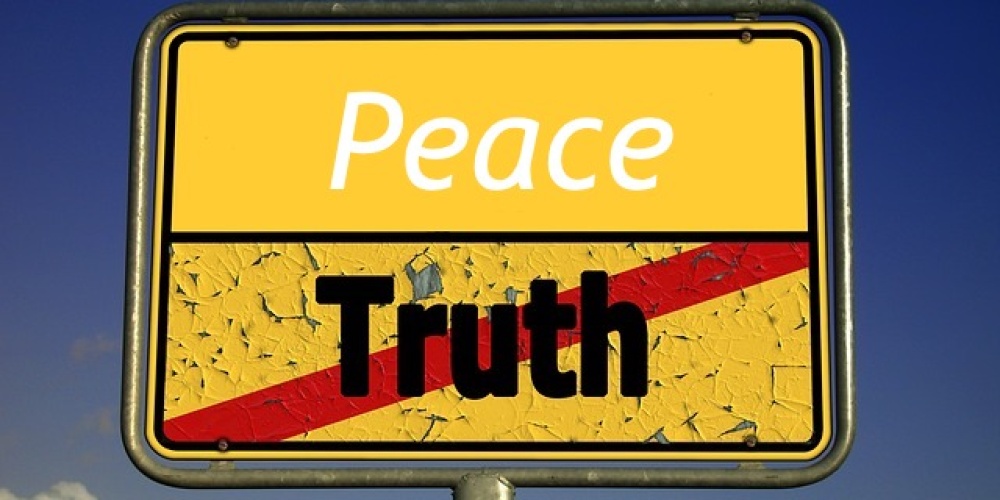
“Thus said the Lord of hosts: The fast of the fourth [month] (17 Tammuz ), and the fast of the fifth (9 Av), and the fast of the seventh (Tzom Gedaliah, 3 Tishrei), and the fast of the tenth (10 Tevet), will be to the house of Judah for joy and gladness, and happy festivals; and love truth and peace” (Zecharia 8:19).
Zecharia looks forward to a day when the days of tragedy for the Jewish people will become days of joy, and truth and peace can co-exist in perfect harmony.
Truth and peace reflect opposing values, and are in a constant state of conflict—at times, tragically, even violent conflict. “Moshe emet vtorato emet, Moshe is true and his Torah is true”, and being an “ohev shalom vrodef shalom, a lover of peace and a seeker of peace” as his brother Aharon was, is in this world at least, impossible. “Chotamu shel Hakadosh Baruch Hu emet, the signature of G-d is truth,” (Shabbat 55a) reflects how G-d in heaven operates; but we on earth live in an olam sheker, a world full of falsehood. Only in the Messianic Era, when the fast days of the 4th, 5th 7th and 10th month will be days of rejoicing, will peace and truth be able to exist side by side in harmony. In the interim, we must do our best to balance these two needs, at times veering towards truth and at other times towards peace. Where one draws the line can change depending on the circumstances and undoubtedly, many well-meaning people will argue over the respective importance to place on each value. This tension manifests itself in Judaism’s system of justice.
“Rav Eliezer the son of Rav Yossi Haglili said: It is forbidden levtzoah, to arbitrate, in a settlement, and he who arbitrates sins, and whoever praises such an arbitrator curses the Lord, for it is written (Tehillim 10:3), ‘He that blesses an arbiter scorns the Lord’” (Sanhedrin 6b).
“Justice, justice you shall pursue” (Devarim 16:20). The Torah demands that our court system be one of uncompromising truth. Rich, poor, old, young, a broken family, it all makes no difference. The law is the law is the law. “And so Moses’ motto was: Let the law pierce the mountain” (Sanhedrin 6b). The law must be applied with 100% objectivity, and the courtroom is no place to have mercy on the needy. Chesed must take place outside, and only outside, of the courtroom. To have some arbitrators reach a compromise is a distortion of justice, and is thus forbidden.
Or is it? “Aaron, however, loved peace and pursued peace and made peace between man and man, as it is written (Malachai 2:6), ‘The law of truth was in his mouth, unrighteousness was not found in his lips, he walked with Me in peace and uprightness and did turn many away from iniquity’”. And with peace as our primary goal, “Rav Yehudah ben Korcha says: Settlement by arbitration is a meritorious act, for it is written (Zechariah 8:16), ‘Execute the judgment of truth and peace in your gates’. Surely where there is strict justice there is no peace, and where there is peace, there is no strict justice! But what is that kind of justice with which peace abides? — We must say: Arbitration” (Sanhedrin 6b).
We must pursue justice, Rav Yehuda argues, but not at the price of peace. A just compromise may not please everyone or even anyone, but it may be the best path towards moving forward together. Instead of piercing the mountain, we act lifnim meshurat hadin, literally, “before the straightness” of the law can cause unintended damage. Sometimes, non-legal considerations should and must play a role in legal discussions. This is the way to bring together justice and peace. Most fittingly, whereas a legal decision is binding even if it should be a two to one vote, a peshara, an arbitrated compromise, must be agreed upon unanimously by the judges.
Perhaps the importance of compromise for the sake of peace is reflected in the teaching of Rav Nachman in the name of Rav Yochanan: “Any judge who dan din emet leamito, judges a true judgment in truth, causes the Shechinah, Divine presence, to dwell in Israel, for it is written (Tehillim 82:1): G-d stands in the Congregation of God; in the midst of the judges He judges'” (Sanhedrin 7a).
One can judge a din emet, a truthful judgment, according to Jewish law. However, at times this is not enough. There are truths beyond legal truths—sociological, psychological, historical, moral—and it is these truths that must also be taken into account if one is to achieve a din emet leamito. The law cannot be applied in a vacuum, but only through the prism of real life. It is for this reason that a Supreme Court will often revisit a ruling made years prior, despite the fact that no change has been made to the constitution. Changing circumstances may call for a changed law, even if the law itself has not changed.
Moshe and Aharon focused on truth and peace, respectively. Too much truth leads to the breaking of the Tablets, and too much peace leads to the building of the golden calf. It is the proper blending of the two that allows for great leadership to emerge.
It is not easy to render a din emet leamito, to blend truth and peace into a harmonious whole. But those who can do so bring the Divine to earth – harmonizing truth and peace even before the Messianic Era.



